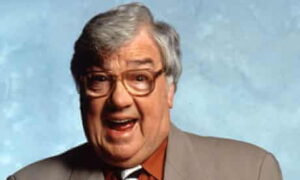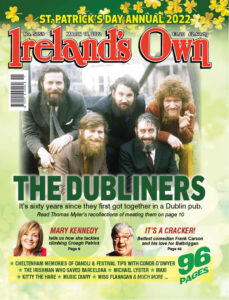In the mid-60s, my mother knitted me an almost exact replica of this hat.

A blog of words, wandering thoughts, supportive posts applauding work by creative people and sprinklings of life's bric-a-brac. AVAILABLE FOR FREELANCE WRITING COMMISSIONS joecushnan@aol.com 2021 memoir Has Anybody Here Seen Kelly? available from various booksellers.
In the mid-60s, my mother knitted me an almost exact replica of this hat.

Borrowed from Ireland's Own, 8 March, 2022, my piece on Frank Carson.
Frank Carson, who died at 87 ten years ago, was a master rat-a-tat-tat gag man, a comedian with a distinctive Belfast accent, a cackle of a laugh and two memorable catchphrases, “it’s the way I tell ‘em’” and “it’s a cracker”. Jokes would pour out of him at a rapid rate, so if one fell flat, he was already straight into the next one. It was both his adopted performing style and a way to survive some of the rough, tough clubs and pubs on the comedy circuit in the 1960s and beyond.

He could be a bit of a nightmare for chat show hosts when he went on a riff, so much so that Spike Milligan is reported to have said, “What’s the difference between Frank Carson and the M1? You can turn off the M1.”
Frank was born in 1926, the son of a binman, and raised in working-class Belfast, in ‘Little Italy’, near the docks. As a young boy in the Great Patrick Street/Corporation Street area, he recalled watching sheep, cattle, horses and carts as the main traffic in the streets where he played.
His local church was St. Patrick’s and he attended the neighbouring St. Patrick’s Christian Brothers Primary School, both on Donegall Street.
In a television documentary, he told the story of one day when he was on his way home from school, he stopped to look in a shop window and saw his reflection. Looking at himself, he said out loud, “One day, you’re going to be famous.”
He left school at 14 and trained as an electrician before becoming a plasterer. He worked the trade on local houses and church interiors, amongst others. But his ambition for fame never left his head.
At 18, he joined the Parachute Regiment and spent three years of duties in the Middle East in the 1950s. He maintained that a military career was one of the easiest ways to get a job.
On one occasion, he was shot in the leg and, in another, narrowly escaped death when a bomb exploded very close to his squad. The seven men he was with were killed. He never forgot the time he shot dead an armed terrorist who was trying to shoot him. In all, he made around forty parachute jumps for his regiment.
Back in civvy street in the 1960s, and honing his talent as a comedian, Frank began to enjoy various jobs on Irish television. He moved to England to try the northern working men’s clubs, notorious for audiences that could make or break performers. It was both challenging and educational. He stuck at it and, in hindsight, it paid off. His big TV break and launch pad to the fame he craved came in 1968 when he entered TV’s Opportunity Knocks, a prime-time talent competition show hosted by Hughie Green. He won it three times.
On the back of that success, in 1971, he was hired by producer Johnny Hamp for a new Granada Television show called The Comedians.
This was a simple format. Hamp recruited a long list of club comics to do stand-up joke-telling routines which were edited into half-hour shows. Frank appeared with Bernard Manning, Jim Bowen, Stan Boardman, Jimmy Cricket, Mike Reid, Ken Goodwin, Charlie Williams and many more over the years.
The Comedians show was a big success.
Frank also made regular appearances on The Good Old Days, Blankety Blank, Noel’s House Party, Celebrity Squares and The Wheeltappers and Shunters Social Club, to name a few. He was a guest on many talk and variety shows. He also dabbled in children’s television with appearances on the whacky Saturday morning show Tiswas, and took on occasional acting roles. In 1985, he was surprised at Heathrow Airport by Eamonn Andrews for a This Is Your Life episode.
Away from showbusiness, he devoted considerable time to charity work. He raised millions of pounds over the years and could claim credit for his part in the Variety Club of Great Britain’s efforts to fund Sunshine coaches for the underprivileged. He promoted integrated education. In 1987, Pope John Paul II made him a knight of the Order of St Gregory at a private audience in Rome.
 Back in the 1950s he and his wife, Ruth, spent their honeymoon in Balbriggan, the Fingal coastal town, fell in love with the place and made the decision to live there. Frank served two terms as Lord Mayor and became a much-loved ambassador. He is quoted as saying, “Balbriggan is my favourite place in the world.” He wrote and recorded a song called Lovely Balbriggan with You’re a Cracker on the b-side.
Back in the 1950s he and his wife, Ruth, spent their honeymoon in Balbriggan, the Fingal coastal town, fell in love with the place and made the decision to live there. Frank served two terms as Lord Mayor and became a much-loved ambassador. He is quoted as saying, “Balbriggan is my favourite place in the world.” He wrote and recorded a song called Lovely Balbriggan with You’re a Cracker on the b-side.
He made a few friendly jokes about Balbriggan. “On a clear day you can see the Irish sea. On a rough day, you’re in it.” “It’s fifteen miles from Sellafield. You can put your arm in the water and get a free x-ray.” The song is sentimental: “Oh Balbriggan, lovely Balbriggan, jewel by the sea, though I’ve done some roamin’ I’d rather be home in Balbriggan by the sea.” The pop charts were untroubled by the record, but the people of Balbriggan loved it.
Frank Carson was a comedian to the very end. In 2011, he was diagnosed with stomach cancer but happily accepted an invitation to attend a Variety Club dinner at Claridge’s Hotel in honour of the Duke of Edinburgh’s 90th birthday. After lunch, there was an afternoon of comedy. Frank took it in his stride and though unwell, went down a storm with the audience and especially with the guest of honour.
Frank never lost his connection and love for Belfast. As his career progressed, the family moved to Liverpool and later set up home in Blackpool where he succumbed to the cancer and died at 85 on 22 February 2012. He was a great family man, comedian and humanitarian.
He really was a cracker!
World Book Day 3 March, 2022
In 1960, my father, John Cushnan, left our Belfast home, his wife and seven young children and vanished, The next we heard of him was when we were told he had died at 57 in 1982, in Clapham, London. In his Clapham years he reinvented himself as John Kelly from Derry. Apart from anything else, he left us with a mystery of 22 missing years. This is a story of his cowardly abandonment of his family and of my heroic mother, Rita, who raised seven children single-handedly.
This memoir can be purchased here: https://www.amazon.co.uk/Has-Anybody-Here-Seen-Kelly/dp/1803022450/ref=sr_1_1?crid=3F2NZ9WTVWAAE&keywords=joe+cushnan&qid=1646335908&s=books&sprefix=%2Cstripbooks%2C51&sr=1-1
A Force Like No Other
The Last Shift
By
Colin Breen
https://blackstaffpress.com/a-force-like-no-other-3-the-last-shift-9781780733319
This is book 3 in a compelling and important trilogy comprising stories and memories from officers who served in the Royal Ulster Constabulary (RUC) during Northern Ireland’s so-called Troubles.
Some of the recollections describe the horrific events of those times, of cold-blooded murder, attempted murder, severe injuries, mental anguish, and police officers’ lives always on alert, always on guard whether on or off duty. Any mistake in a routine or misstep on a procedure could have resulted in death or injury, and sometimes did.
The everyday duties combatting terrorists were coupled with routine crimes like burglary and robberies, but often behind a hedge or in the shadows someone’s finger was on a trigger or close to pressing a detonator whenever and wherever the police attended an incident. Hoax calls to lure officers to an ambush were frequent. Sometimes the outcomes were safe enough but other times officers weren’t so lucky.
The mental pressures were enormous as officers had to look at dead bodies, badly mutilated bodies, bodies with missing limbs and, occasionally, body parts scattered over a wide area after full impact explosions.
Police officers’ families too had to be aware of the risks and dangers of someone ready to attack homes. Wives and husbands of officers would hope and pray that their loved ones would return home after their shifts. “Sitting at home listening to the clock tick, dreading a knock on the door, having to keep feelings bottled up …………..” Nothing was certain, except worry and anxiety.
But, not everything in this fine book is as serious as described. There are moments of humour. (When you buy the book, look out for the officer who went for a pee behind a bush and then witnessed the bush walking away. Or the Chief Constable and the pheasant. Or the one about elephants on the road.) In addition, there is much evidence of camaraderie.
Colin Breen has achieved something remarkable in this trilogy by recording the memories and feelings of the contributors, human beings doing their jobs in difficult to impossible circumstances. There is honesty here, heartbreak and everlasting sadness, but hard as it is emotionally to read at times, this latest book and its two predecessors are significant and important chronicles of specific aspects of Northern Ireland’s grim recent past.
Highly recommended.